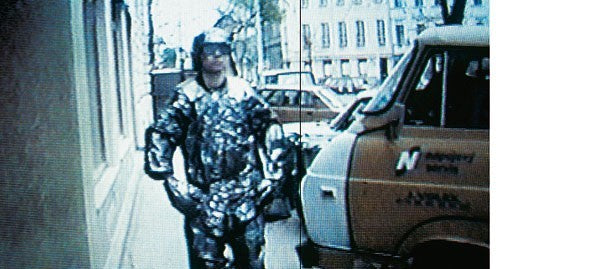Books
Magazines
Art
Editions
Multimedia
Allied Publishers
Authors
Style
Perla Medley
Posters & Postcards
Antiquarian




A scheme of operation,
modern art and what came after it is one of the most specialized domains ever produced by the Western civilization. Yet modern and contemporary artists have never been showing deep respect for the civilization that created them. They often called for reformation or a direct rejection of civilization. In the 19th century they appealed to run into exotic countries, in the 20th century they even planned the change of the whole world. The art of the last century is typical for its admiration of demonstrations which were by most people considered hopelessly “primitive”. The critique of civilization or at least a watchful vigilance towards the principles of how the society works is not just a domain of art. There are new movements arising which try to create their parallel world with it own laws. They don’t renounce the technology which is a product of the system they revolt against but they use it in a different way, liberated from the hierarchical context of the surrounding civilization. The Western countryside is being crossed by caravans of independent sound systems, there are various communities linked via mobile nets. As the art of avant garde got joined with the art of native nations or the visual art manifestations of kids or insane people, the architects of this day are inspired by improvised architecture of slums and weekend houses, the media theoreticians defend CD copying and artists take seriously those who in various ways recycle the products of bloated industry. Among them Krištof Kintera has an air of a deliberate civilization vagrant who most of all cherishes his freedom to see things from outside. He doesn’t have to run away to Tahiti but likes to examine in a trivial way the mechanisms of the society surrounding him. As any contemporary artist he is somewhere at the top of the hierarchy of the food pyramid of the civilization metabolism but that doesn’t mean that he is an elitist. He works in a simple way, always using only those means and abilities he has at hand. Many of Kintera’s works seem to show our world as if it has just undergone some unseen apocalypse which leaves the surviving to manage their living with a skillful help of ruins and rubbish, leftovers of the catastrophe. The mutated objects have their own life, the crazy electronics and uncontrollable biotechnologies wipe off the boundaries between the living and the dead. Kintera works with what he finds around. Surely we can say something similar of any artist, but a tiny bit more of Kintera. He is a gatherer who lives on the discoveries of objects and situations. He buys, recycles objects and ideas, shifts them into consequences for which they were not mentioned but help to explain their essence. He is a hacker of the goods whose main characteristic is the ability of improvisation. The absurdity of today’s world in his works is visible just because they are mostly inconspicuous, the viewer must approach them figuratively to see them and hear them. These silent, subversive strokes don’t want to change the outer world, they don’t plan a revolution, their ambition is to change our perception of the world around us and ourselves.
Tomáš Pospiszyl
English and Czech
96 pages in colour and hardback + DVD
24 x 21,5 x 1,3 cm
Text: Tomáš Pospiszyl
Interview: Přemysl Dobyduch
Graphic layout: Krištof Kintera
Repro: Blanka Brixová
Print works: DIVUS
Translation: Magda Pěnčiková, William Hollister
2006
ISBN: 80-86450-39-2